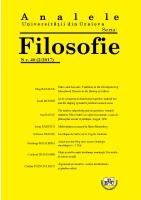LA CRITIQUE DE SARTRE SUR LE COGITO CARTÉSIEN
SARTRE’S CRITICISM OF THE CARTESIAN COGITO
Author(s): Adriana NeacșuSubject(s): Philosophy of Mind, Cognitive Psychology, Psychology of Self
Published by: Editura Universitaria Craiova
Keywords: consciousness; reflexive cogito; pre‐reflexive cogito; ego; thought; being‐for‐itself; other‐for‐himself;
Summary/Abstract: Sartre admits that cogito is the proper name for consciousness, to which he maintains the specific of ʺthoughtʺ given to it by Descartes. But he makes a firm separation between ego and cogito, therefore between ʺIʺ and ʺthoughtʺ, which Descartes always considered together. Sartre criticizes the Cartesian reflexive cogito because it cannot fully explain the specificity of consciousness, and he introduces the concept of the ʺpre‐reflexive cogitoʺ, a condition of the reflexive cogito. He emphasizes the essential difference between the Cartesian cogito, isolated in complete solitude, and his own cogito, namely the consciousness as being‐for‐itself, which opens towards the other, conceived like other‐for‐himself.
Journal: ANALELE UNIVERSITĂȚII DIN CRAIOVA. SERIA FILOSOFIE
- Issue Year: 2/2017
- Issue No: 40
- Page Range: 73-90
- Page Count: 18
- Language: French

